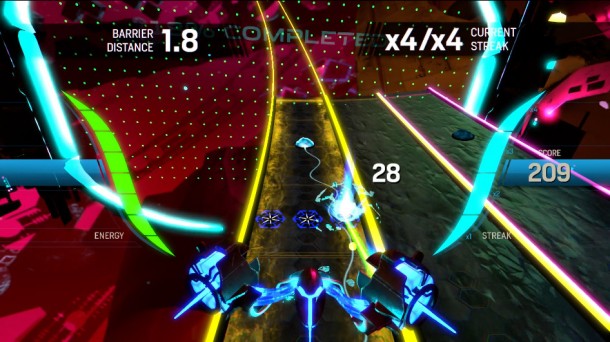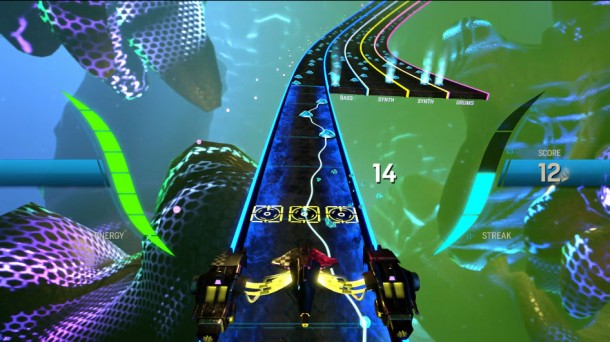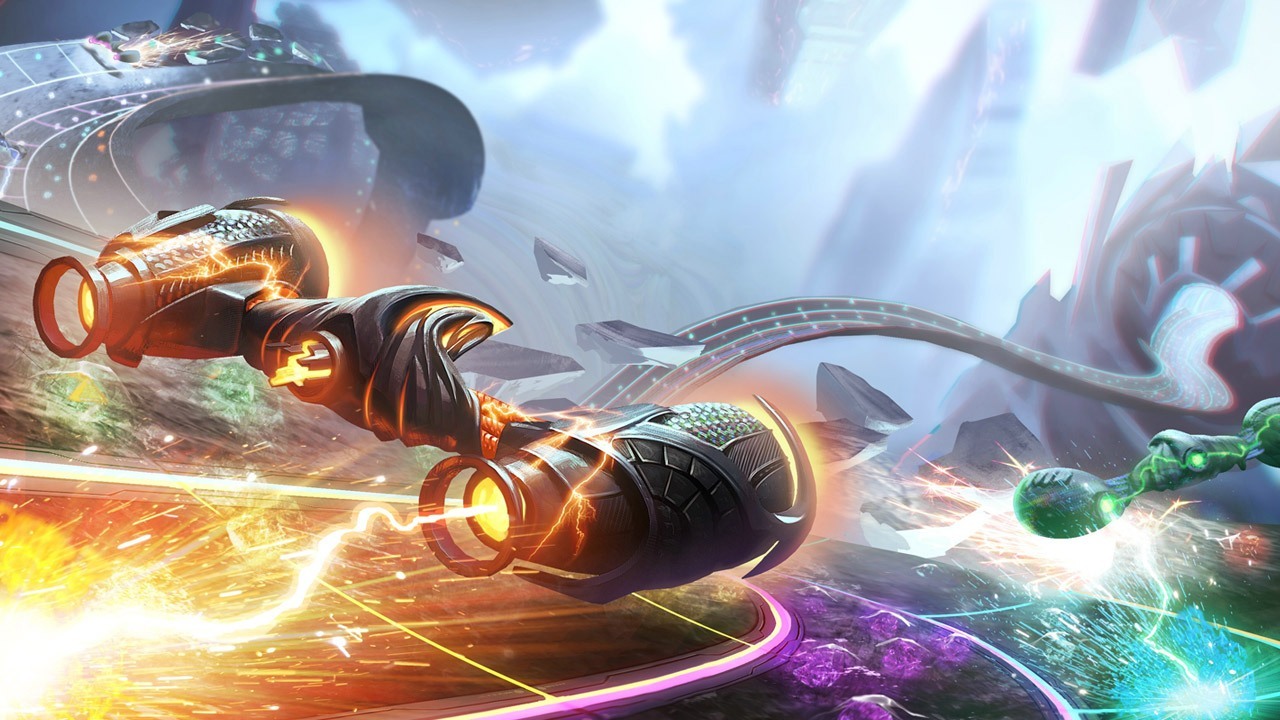The original Amplitude is a strange beast. It was instrumental (pun!) in the history of modern rhythm games, refining the ideas laid out in 2001’s Frequency and laying the framework that would eventually evolve into Guitar Hero and Rock Band. That being said, as influential a game as Amplitude was, it ended up being lost to time, sans a small (albeit vocal) cult fanbase.
This latest edition of the game is built on the studio’s in-house Forge engine, which was previously developed for Rock Band 4. That being said, the colors and aesthetic of the tracks are extremely similar to the plastic instrument game — which isn’t to say that it looks bad, just that it’s a far cry from the original game’s look, which varied from a psychedelic fever dream to settings that were vaguely Blade Runner-esque. It just all feels very samey.
At it’s core, though, Amplitude is still a rhythm game, and the music should be front and center to its discussion. When it comes to song variety, this modern incarnation of the game is a bit more bare-boned than it’s predecessor. Featuring only 30 songs (15 of which were created specifically for the game’s campaign) and no real licensed tracks to speak of. Whereas the original game included tracks from the likes of David Bowie, Weezer and Blink 182, this version instead sees the inclusion of songs from indie darlings like Darren Korb (Bastion, Transistor) Danny Baranowsky (Crypt of the Necrodancer) and Jim Guthrie (Sword & Sworcery, Indie Game: The Movie) and from Kickstarter backers who pledged at the $20,000 tier, such as Insomniac Games and Wolfgun.

There aren’t any apparent hooks for future downloadable content packs, but I certainly wouldn’t count it out, as DLC tracks have done extremely well for Harmonix in the past and Amplitude would definitely benefit from an expanded catalog.
The game plays exactly as you would expect a game called Amplitude to play in 2016. I know that could sound hyperbolic and facetious, but I mean it in the most genuine possible way. All of the decade old muscle memory I had from playing the original game in high school immediately returned within minutes, and I was able to fall right back into the groove.
It should be noted that Harmonix tried to shoehorn in a semblance of a story into the campaign mode, which I won’t really say is a knock against it but ends up feeling wholly unnecessary. The art during the interstitial scenes talking about helping a patient suffering from some synesthesia-related ailment is an interesting idea, for sure, but it doesn’t help or hinder the game in any way.

That’s not to say the game is without flaws, though. The track highway is a lot wider than I remember it being; if you’re playing out the track on the far sides, the ones opposite aren’t visible and it becomes extremely difficult to pop over and continue a combo chain without memorizing what’s coming over several plays, especially at higher difficulties. Sure, you could make the argument that it’s intentional and part of the game, but I can also see the argument being made that it’s just bad design.
The game’s multiplayer is definitely a point of contention as well. The game features local multiplayer for up to four, who can either work in teams or in a free-for-all score challenge. Online multiplayer is conspicuously absent, however. This is especially notable because online play was one of the of the biggest selling points and aspects most fondly remembered about the original Amplitude, as it ran for years until the servers were eventually shut down in 2007. With the lack of online play aside, the multiplayer is fun, especially when you have a couch with four people intent on screwing each other over at all times.
For $20, you really can’t go wrong with Amplitude, so long as you are the type of person that enjoys rhythm games. There’s not a ton of variety there, but what it does have is incredibly fun and not too bad to look at, either. Sure, it would definitely help to have an online multiplayer mode and an expanded track list, but in all honesty, I’m shocked that this game even exists in 2016. The fact that it’s good and a worthy successor to such a cult hit is just icing on the cake.
This review is based on a retail Steam code sent to SideQuesting by the publisher.


No Comments